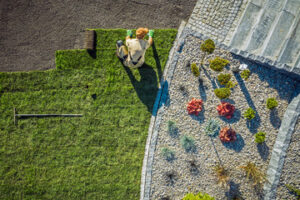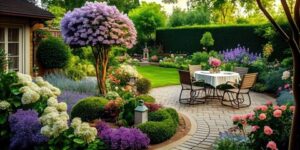Landscaping is the process of designing and converting outdoor areas to make them more attractive and functional. It involves adding plants, changing the terrain and constructing structures like fences, walls, walkways, patios and water features.

Texture adds depth and intrigue to your landscape design. Different plant sizes, leaf shapes, textures and colors create visual weight that draws the eye. Contact Prime Cut Lawn And Landscaping for professional help.
Color can be one of the most important aspects of any landscape design. It can create focal points, evoke emotions, enhance space and perspective, establish harmony, and even promote relaxation. Using the principles of color theory, homeowners can elevate their outdoor spaces into works of art that are visually stunning and emotionally resonant.
Every landscape should have a dominant color that sets the tone. Whether it’s the green of your lawn, the red flowers of a flower bed, or the blue water feature of a pool, a dominant color will provide structure and direction to the design. Accent colors should complement the dominant hue and help capture attention. Understanding the color wheel is an excellent way to explore contrasting and complementary color schemes.
A landscape’s color can have a significant environmental impact as well. Lighter colors reflect heat and keep your landscape cooler, while darker features absorb and retain heat. In addition, the use of color can affect how plants grow and influence the health of trees.
Another aspect of landscape color is unity. A dominant color can unite a garden by making it feel like everything belongs together, even if there is a lot of variety. Landscapers often utilize the color of a home’s exterior, fences, and other surrounding architectural elements to create unity in a garden.
Finally, contrast can be used to highlight different elements of the landscape. Planting different size shrubs, incorporating varied leaf shapes and textures, or mixing colors in the hardscapes can all add visual interest and depth to your landscape. Incorporating lines into your landscape design also helps draw the eye where you want it to go. Lines can be perceived, like a pathway or wall lining a planting bed, or they can be physical, like a walkway or patio that leads to an architectural element or a focal point.
Form
Form in landscape design refers to the overall three dimensional shape of elements such as plant material, structures, and garden ornaments. Shapes are either formal with straight lines, angular layouts, and symmetrical balance or informal/naturalistic with meandering lines, organic edges, and clustered forms. Form also includes negative space or empty areas that balance and unite different components of the landscape.
Lines in a landscape are created with various structure within the landscape including bedlines, pathways, hardscape paths, sod and fence lines. They can be straight, curved, horizontal, vertical or diagonal. Landscapers use these lines to create movement in a garden or yard and direct the eye around the landscape. Lines are important for creating contrast and highlighting other design elements such as color, texture and pattern.
Pattern is created by contrasting textures, sizes and shapes of plant materials as well as colors within the same plants. A mix of coarse and fine textures, rough or smooth surface, and light or heavy foliage can help the landscape feel unified. A repetition of shape and form can create unity but too much repetition can become visually overwhelming. Contrast is key to keeping the landscape interesting and engaging.
Observe and study the landscapes in your neighborhood and community that appeal to you. Study the elements and principles that make them appealing. Taking notes on the elements and principles will help you create your own unique landscape. Having an understanding of the basic elements and principles will allow you to see how other landscapes are designed, which will help you determine what landscape is best for your home and yard. Then you can implement those principles to create a space that will bring enjoyment and function to your life.
Movement
Landscape design can incorporate a variety of elements. For example, a backyard space may include softscape (like flowers, plants and turf grass) as well as hardscape (like walkways and patios). Additionally, it can also incorporate water features like ponds or fountains, lighting fixtures and more.
The use of these elements helps to create a sense of movement and flow in the yard. This is particularly important when it comes to designing a yard that is functional and pleasing. For example, creating rhythm by placing stones close together or far apart on a pathway can influence how quickly people move through the space. Or, installing a backyard waterfall can add movement and sound to the garden while also providing a relaxing place for homeowners to enjoy the scenery.
Another important element of landscape design is form. This refers to the shape and size of the different elements in a garden. For example, using taller plants and structures can draw the eye upward, making a small space feel bigger. Conversely, using low lines — such as ground-level gardens walls and pathways — can help to tie the whole area together.
Landscaping can have a significant impact on the environment, as well as the health and wellbeing of its homeowners. For example, planting trees and other plants can improve air quality by removing carbon dioxide and dust from the air. In addition, mowing lawns with mulch and compost instead of toxic chemicals can protect the environment as well as promote healthy soil.
Whether you’re an experienced landscaper or just starting out, there’s a career path for everyone in the industry. Find out more about how you can become a landscape professional by clicking here.
Sequence
In landscape design, the arrangement of elements in a sequence contributes to the overall aesthetic and experience of the space. Rhythmic patterns and structured sequences evoke a sense of harmony that enhances the beauty and functionality of outdoor spaces. The harmonious flow of landscape features can also impact the way individuals interact with the space.
For instance, the pattern of repetition can help to direct the eye through a landscape, drawing attention to different areas in an intentional manner. For example, if you want to draw the viewer’s attention toward the entrance of your property, you can use a line of shrubs to direct them there. This is an effective method of using repetition, but it’s important to be careful not to overdo it. Too much repetition can lead to monotony.
The varying heights, textures, colors, and forms of landscape elements can also create balance by spreading out their mass throughout a space. In addition, the balance can be achieved by the use of contrasting features such as a large element balanced on one side by two or three smaller components with comparable masses.
Creating the right job sequencing is essential to efficient landscaping operations, especially maintenance. By arranging different tasks in the correct order, you can ensure that each task is completed properly and on time.
Sequence in a landscape can play on human emotions, evoking feelings of anticipation and expectation. The way a driveway ribbons up to the house or the way a homestead is arranged amongst rolling hills and woodlands can inspire feelings of excitement and awe. The right sequence can elevate the aesthetics of a space and transform it into a work of art that speaks to the soul.
Focalization
Focalization is the use of a single feature to draw the eye into the landscape. Oftentimes this is done with water features such as fountains, streams or waterfalls. Other examples include statues, sculptures and arbors. Focalization can also be used in flower beds to create a stunning, eye-popping feature. The focal point can also be used to help distract the eye from an unsightly element such as a utility pole or immovable structure.
It’s important to consider the size of a focal point and how it will be viewed. Focal points that are too large can overwhelm the landscape and become visually unbalanced. Focal points should be proportional to the overall design and landscape. Incorporating contrasting colors can also add to the visual appeal of a focal point by bringing attention to particular elements or areas of the landscape.
A landscape designer must be able to determine the optimum proportion of the focal point to the rest of the garden. For example, a large pond or water feature might be a good choice to complement the architecture of a contemporary home but not so large that it becomes overwhelming or out of scale.
Focal points can be made from a variety of materials, but it is important that they be a natural part of the landscape and complement the style of the house and property. Focal points should be eye-catching, but not gaudy or over-done. The use of repetition and rhythm is another key element in creating a harmonious landscape. This is achieved by using similar forms repeated at either regular or irregular intervals to create a sense of unity and harmony. For example, the repetition of boxwoods or clipped cedars can create rhythm in a garden.

